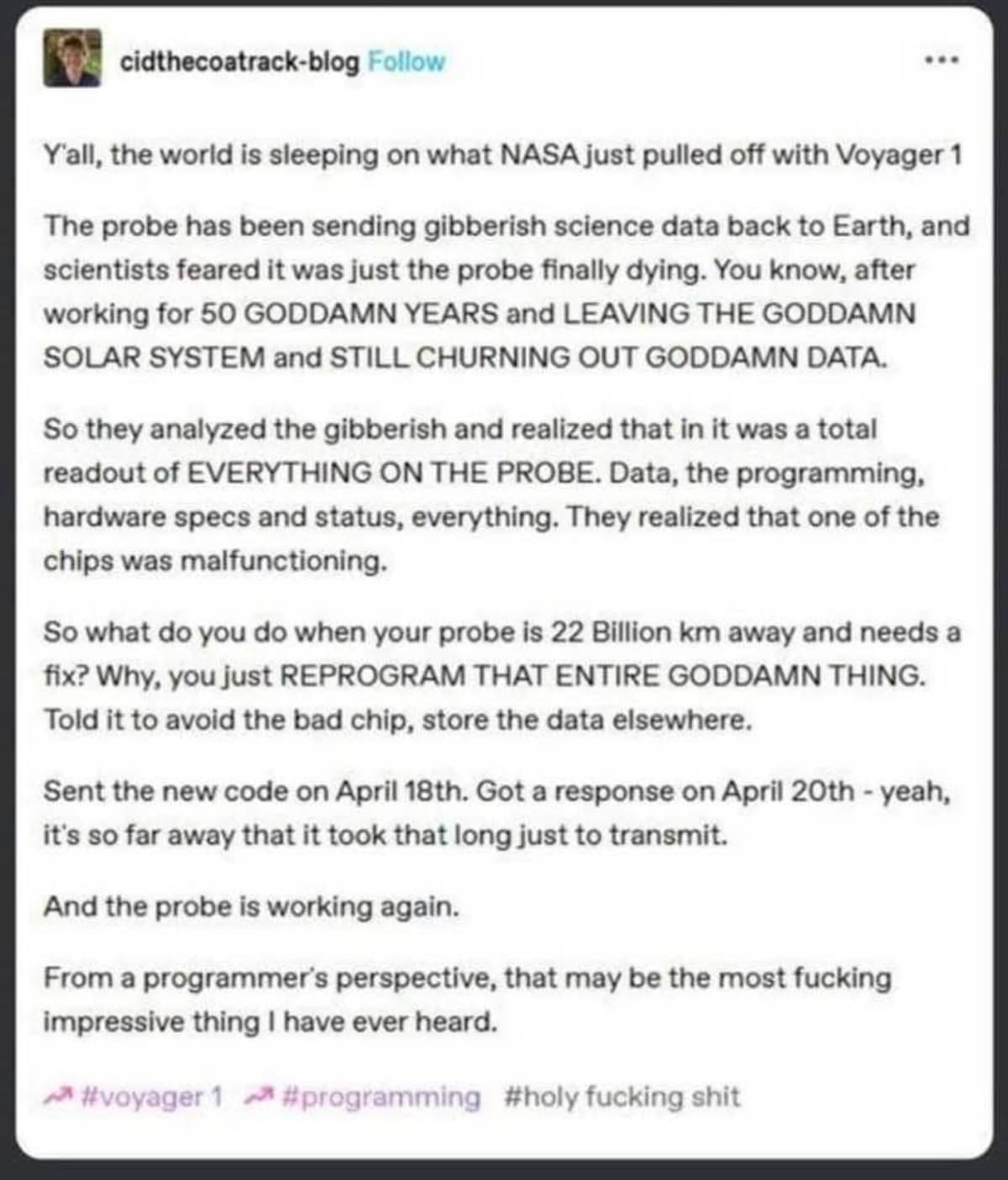this post was submitted on 06 May 2024
2440 points (99.2% liked)
Science Memes
10832 readers
2247 users here now
Welcome to c/science_memes @ Mander.xyz!
A place for majestic STEMLORD peacocking, as well as memes about the realities of working in a lab.

Rules
- Don't throw mud. Behave like an intellectual and remember the human.
- Keep it rooted (on topic).
- No spam.
- Infographics welcome, get schooled.
Research Committee
Other Mander Communities
Science and Research
Biology and Life Sciences
- [email protected]
- [email protected]
- [email protected]
- [email protected]
- [email protected]
- [email protected]
- [email protected]
- [email protected]
- [email protected]
- [email protected]
- [email protected]
- [email protected]
- [email protected]
- [email protected]
- [email protected]
- [email protected]
- [email protected]
- [email protected]
- [email protected]
- [email protected]
- [email protected]
- [email protected]
- [email protected]
- [email protected]
- !reptiles and [email protected]
Physical Sciences
- [email protected]
- [email protected]
- [email protected]
- [email protected]
- [email protected]
- [email protected]
- [email protected]
- [email protected]
- [email protected]
Humanities and Social Sciences
Practical and Applied Sciences
- !exercise-and [email protected]
- [email protected]
- !self [email protected]
- [email protected]
- [email protected]
- [email protected]
Memes
Miscellaneous
founded 2 years ago
MODERATORS
you are viewing a single comment's thread
view the rest of the comments
view the rest of the comments

I realize the Voyager project may not be super well funded today (how is it funded, just general NASA funds now?), just wondering what they have hardware-wise (or ever had). Certainly the Voyager system had to have precursors (versions)?
Or do they have a simulator of it today - we're talking about early 70's hardware, should be fairly straightforward to replicate in software? Perhaps some independent geeks have done this for fun? (I've read of some old hardware such as 8088 being replicated in software because some geeks just like doing things like that).
I have no idea how NASA functions with old projects like this, and I'm surely not saying I have better ideas - they've probably thought of a million more ways to validate what they're doing.
Probably brought in some of the original guys for one last job.
takes long drag off cigarette "I'm too old for this shit"
You sure? The smell off some of the corpses will have been terrible.
I'm not saying they're all dead, but an intern at the time of launch would now be 70. Anybody who actually designed anything is... Well... The odds of them still being around are low.
I have a uncle who worked on Apollo writing machine code, and he is a spry, clear-headed 80-something-year-old.
IIRC, they did pull in a guy who had just started his career on the project.
Son of a bitch, I'm in.
do I hear heist movie?
The Hard Fork podcast had a pretty good episode recently where they interviewed one of the engineers on the project. They’d troubleshooted the spacecraft enough in the past that they weren’t starting from square one, but it still sounded pretty difficult.
They apparently didn't have an emulator. The first thing I'd have done when working on a solution would have been to build one, but they seem to have pulled it off without.
There is an fascinating documentary about the team that sends the commands to Voyager 1 and 2 called It's Quieter in the Twilight
100% they've got an emulator, they've had dedicated test environments since the moon landing for emulating disaster recovery scenarios since the moon landings, they've likely got at least one functioning hardware replica and very likely can spin up a hardware emulation as a virtual machine at will.
Source: I made this up, but I have a good understanding of systems admin and have a interest in space stuff so I'm pretty confident they would have this stuff at bare minimum
That's my assumption too, but we're talking about a different era, and I really have no idea how they approached validation and test/troubleshooting.
I've seen some test environments for manned missions, but that's really for humans to validate what they're doing.
V'ger was quick 'n dirty by comparison (with no criticism of the process or folks involved...they had one chance to get these missions out there).